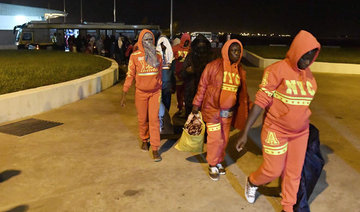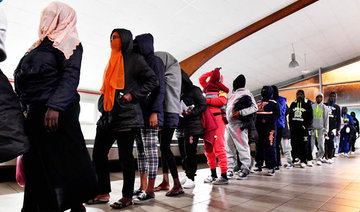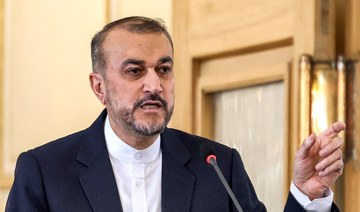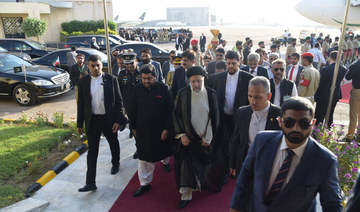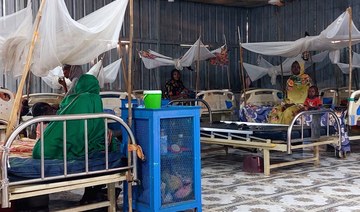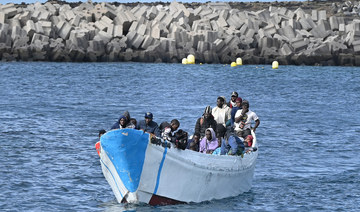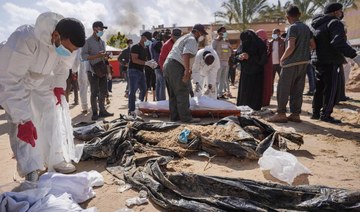YAOUNDE, Cameroon: When uniformed men boarded the overloaded rubber dingy carrying Christelle Timdi and her boyfriend to a new life in Europe, she thought the Italian coast guard had come to rescue them. But the men took out guns and began to shoot. “Many people fell in the sea,” the 32-year-old Cameroonian said as she described seeing her boyfriend, Douglas, falling in the water and disappearing into the darkness.
The gunmen took Timdi and her fellow passengers back to Libya where they were locked up, raped, beaten and forced to make calls to their families back home for ransom payments to secure their freedom.
Libya’s UN-backed government has said it is investigating and has promised to bring the perpetrators to justice.
“I saw it with my own eyes,” she said, describing how she had seen a Senegalese man buying an African migrant.
Timdi said many traffickers posed as marine guards, police officers and taxi drivers to ensnare victims.
There were around 130 other migrants on her boat when the gunmen opened fire in the middle of the night, Timdi said.
After being taken back to Libya they were locked in an abandoned factory building where men would grab and rape the girls and women — and sometimes even the men.
“We tried to hide the younger girls among us,” Timdi said, describing the terrifying moments when the guards would scour the room with torches, searching for their next victims.
“I was heavily pregnant — that’s why I wasn’t raped. And it’s all done in front of others — they say it’s so that you know what will happen to you if you don’t pay up.”
Timdi said the facilities used by traffickers appeared to be well organized and guarded, adding that most people inside wore fake police or military uniforms.
“The place was surrounded by army-style vehicles with guns ready to fire, so we didn’t dare try and escape.”
Timdi’s family paid 1 million CFA francs ($1,800), frantically collected from relatives and friends, to free her. But she said ransoms were no guarantee of safety.
The traffickers work with a network of taxi drivers who are supposed to transfer released migrants to migrant camps — but who often re-traffick them, Timdi said.
“If they send you a good taxi, you’ll arrive at your destination, but if it’s a bad taxi the driver will sell you on to someone else,” she said.
“There are people who have been resold twice, three times. And when you call your family to tell them that you’ve been resold once again, no one will believe you, they won’t send more money to free you.”
Timdi was released by her captors in October and gave birth to a baby girl, Brittanie, in a Libyan hospital just days later.
Foka Fotsi, a Cameroonian migrant who was trafficked twice, said the clandestine trafficking networks in Libya comprised many nationalities.
Those in charge of one of the places where he was held included Ghanaians and Nigerians, he said.
Unable to find work to support his family, Fotsi decided to leave Cameroon last year, but fell into the hands of a Libyan kidnap ring before reaching Europe.
“There was torture like I’ve never seen. They hit you with wooden bats, with iron bars,” he said, removing the hood of his sweatshirt and showing the still raw red wounds on his skull.
“They hang you from the ceiling by (your) arms and legs and then throw you down to the floor. They swing you and throw you against the wall, over and over again, ten times. “They are not human beings. They are the devil personified.”
Timdi and Fotsi were among 250 Cameroonians who were flown home this week by the International Organization for Migration (IOM) as part of a voluntary return scheme for migrants stranded in Libya.
Fake coast guards and taxi cabs fuel refugee crisis
Fake coast guards and taxi cabs fuel refugee crisis
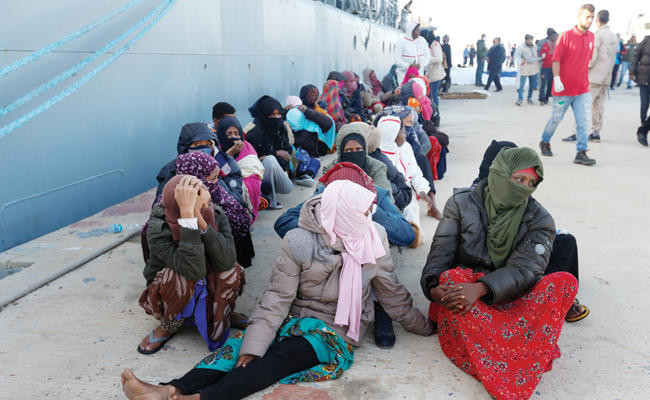
Sudan military downs drones targeting its HQ in Shendi, say army sources
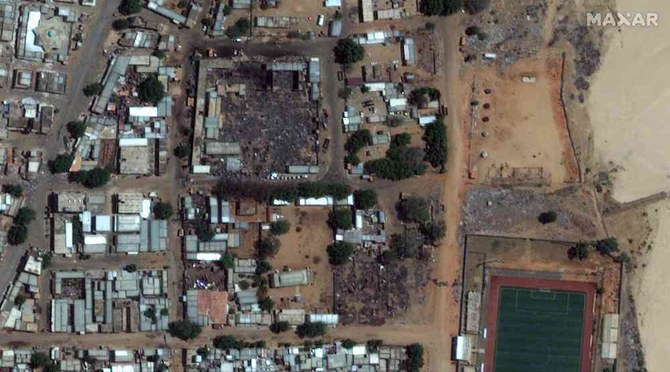
- None of the drones hit their target, the army sources said
- Sudan’s army is battling the paramilitary Rapid Support Forces for control of the vast north African country
CAIRO: Sudan’s army used anti-aircraft missiles on Tuesday to shoot down drones targeting its headquarters in the city of Shendi, witnesses and army sources said, the latest in a series of such drone attacks.
None of the drones hit their target, the army sources said. Reuters could not independently verify the report.
The head of Sudan’s army, General Abdel Fattah Al-Burhan, arrived on Monday in Shendi, which is some 180 km (112 miles) north of the capital Khartoum, army media reported earlier. It was not immediately clear whether he remains in the area.
Sudan’s army is battling the paramilitary Rapid Support Forces (RSF) for control of the vast north African country.
Tuesday’s drone attack is the third targeting areas that remain solidly under army control. The city of Atbara, also in River Nile state, and Al-Gedaref state to the east have also come under drone attack.
Both the army and the RSF have used drones in the conflict, which erupted a year ago.
The RSF, which controls much of Khartoum and western regions of the country, has not claimed responsibility for any of the attacks.
Shendi residents said the attacks have created panic in the town.
The war between the army and RSF has sparked warnings of famine, displaced millions, killed thousands in the crossfire and given way to ethnic killings by the RSF and allied militias.
The war appears likely to spread to the city of Al-Fashir, the army’s final holdout in the Darfur region, with many warning of a humanitarian catastrophe.
Israeli attack on Iran would change ‘circumstances’, Iran’s president says
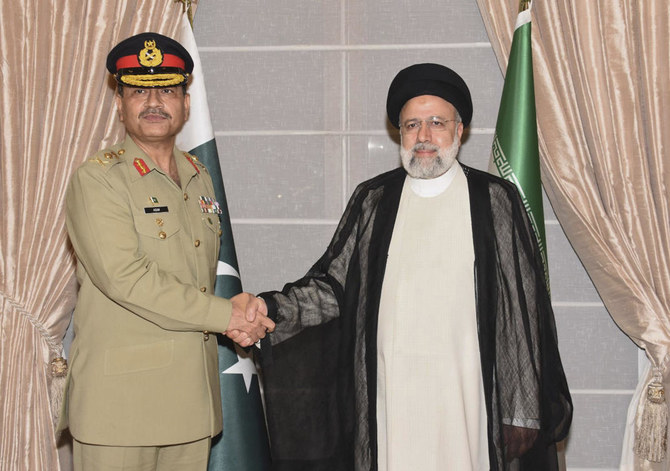
- Raisi was quoted as saying such an attack could possibly result in there be nothing left of the “Zionist regime“
DUBAI: An Israeli attack on Iranian territory would bring about a complete change of “circumstances,” Iran’s President Ebrahim Raisi was quoted as saying on Tuesday by the official IRNA news agency.
Raisi, who is visiting Pakistan, was quoted as saying such an attack could possibly result in there be nothing left of the “Zionist regime.”
Truce crumbles in Sudanese army’s last Darfur holdout
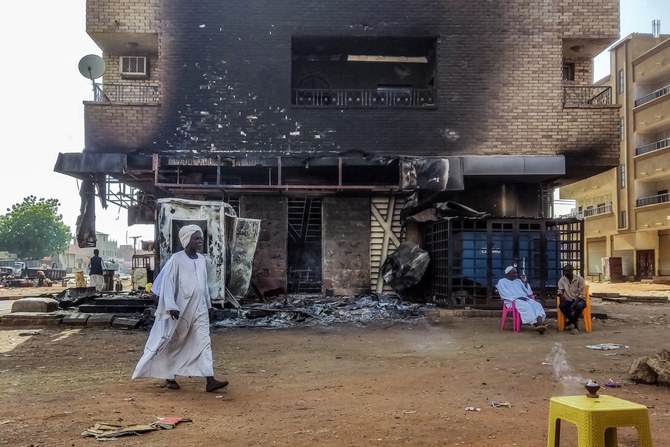
- Al-Fashir is the last major city in the vast, western Darfur region not under control of the paramilitary Rapid Support Forces (RSF)
- Witnesses say the army has reinforced supplies and troops, including through an air drop to its base in the city
CAIRO/DUBAI: Attacks around the Sudanese city of Al-Fashir have shattered a truce that protected it from a year-old war, leading to warnings of a new wave of inter-communal violence and humanitarian risks for 1.6 million residents crammed into the North Darfur capital.
Al-Fashir is the last major city in the vast, western Darfur region not under control of the paramilitary Rapid Support Forces (RSF). The RSF and its allies swept through four other Darfur state capitals last year, and were blamed for a campaign of ethnically driven killings against non-Arab groups and other abuses in West Darfur.
The fight for Al-Fashir, a historic center of power, could be more protracted, inflame ethnic tensions that surfaced in the early-2000s conflict in the region and reach across Sudan’s border with Chad, say residents, aid agencies and analysts.
Al-Fashir’s population includes an estimated half a million people displaced during that earlier conflict, when the army, assisted by Arab militias that evolved into the RSF, put down a rebellion by non-Arab rebel groups.
About half a million more people moved into the city during the war that broke out between the army and the RSF in the capital Khartoum in April 2023, as long-simmering tensions over integrating the two forces came to a head.
As the war spread to other parts of the country, local leaders brokered a truce in Al-Fashir, with the RSF confined to eastern areas of the city while the former rebel groups stayed neutral.
But the arrangement fell apart after the RSF took the town of Melit this month, effectively blockading Al-Fashir.
Witnesses say the army has reinforced supplies and troops, including through an air drop to its base in the city, unlike in other state capitals where soldiers quickly fled.
Two prominent former rebel groups, Minni Minawi’s Sudan Liberation Army (SLA) and Jibril Ibrahim’s Justice and Equality Movement, said they would also defend against the RSF.
Many non-Arabs in Al-Fashir are gripped with fear.
“We don’t know what to do,” 39-year-old resident Mohamed Gasim told Reuters by phone. “Al-Fashir is dangerous, but leaving is more dangerous.”
VILLAGES RAZED
Even before the truce collapsed, occasional skirmishes killed more than 220 people in Al-Fashir in the last year, according to Ismail Khareef, an activist in Abu Shouk, one of the displacement camps that dot the city.
Clashes on April 16 left at least 18 dead, Khareef said. Gunfire and projectiles, including from army warplanes, have fallen on homes, he and other residents say.
Since the start of the month, at least 11 villages on Al-Fashir’s outskirts have been razed, according to satellite imagery obtained by the Yale Humanitarian Research Lab. At least 36,000 have been displaced, the United Nations estimates.
Local activists and an SLA spokesperson blamed the RSF and allied militias, who have been known to use arson in past attacks, including in West Darfur. The activists said that survivors of the attacks reported around 10 people killed and that the attackers used ethnic insults.
The RSF denied attacking Al-Fashir and said it was careful to keep clashes away from civilians in the city, accusing the army and allied groups of attacking it on the outskirts. The RSF has previously denied responsibility for ethnic violence in Darfur.
The army did not immediately respond to requests for comment.
Al-Fashir itself has not had functioning running water or power lines for a year, said Awadalla Hamid, Darfur director for Practical Action, speaking to Reuters from the city, where few international humanitarians remain. Only one public hospital is functioning, while displaced people are crammed into schools and public buildings, he said.
Jerome Tubiana, an expert on Darfur and adviser to medical charity MSF, said all-out fighting “risks already complicating further humanitarian access, at a time where available data shows Al-Fashir is suffering of an extremely serious food crisis.”
SPILLOVER RISK
Since the war began, only small quantities of aid have entered Al-Fashir, the only army-approved conduit for shipments to other parts of Darfur. Residents say that though markets are functioning, the RSF’s control of the main road has caused prices for fuel, water and other goods to soar.
Recent tensions and violence around Al-Fashir have also raised concerns about a wider spillover.
The former rebel groups fighting alongside the army hail from the Zaghawa tribe, which reaches across the border into Chad, counting Chadian leader Mahamat Idriss Deby as a member.
Arab and non-Arab tribes like the Zaghawa have long clashed over land and valuable resources in Darfur, analysts say.
Complicating matters is the entrance of the forces belonging to Musa Hilal, a leading Arab commander from the early 2000s and rival of RSF commander Mohamed Hamdan Dagalo, known as Hemedti, despite hailing from the same tribe. A spokesperson confirmed a video of Hilal addressing forces in North Darfur on Monday, but said that it was too soon to say if the forces would join the fight in Al-Fashir or elsewhere.
“Even if there was a ceasefire between SAF and RSF this is way beyond them. There are scores being settled and tensions being renewed,” said Jonas Horner, an independent Sudan analyst.
Tunisian coast guard retrieves bodies of 19 migrants
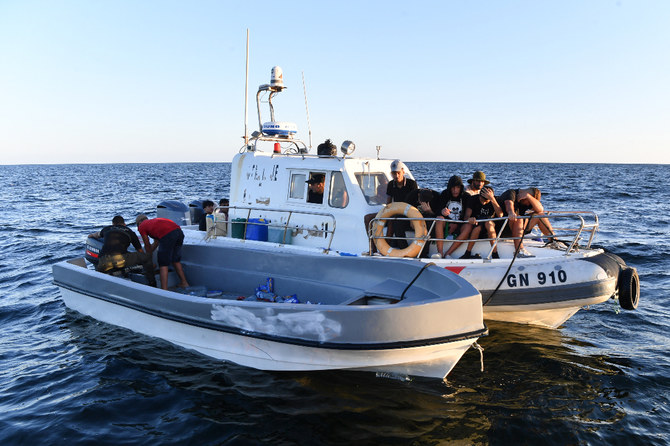
TUNIS, April 23 : The Tunisian coast guard has retrieved the bodies of 19 migrants who were trying to reach the Italian island of Lampedusa, the national guard said on Tuesday.
The latest incident took the number of migrant deaths off the Tunisian coast to nearly 200 in first four months of this year.
Israeli military rejects allegations of burying Palestinians in mass graves at Gaza hospital
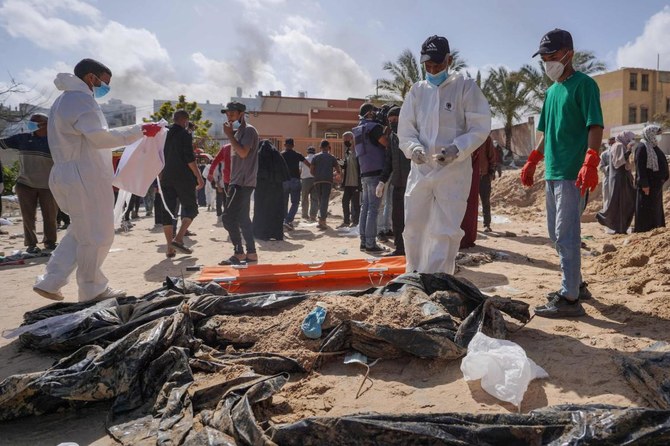
- The military said corpses already buried at Nasser hospital were examined as part of search for hostages
- UN calls for international probe into deaths at Gaza hospitals
GENEVA: Israeli military on Tuesday rejected allegations that its forces buried Palestinians in mass graves at a Gaza hospital, after the United Nations called for international investigation into the deaths during Israeli sieges, saying war crimes may have been committed.
In a statement, the military said corpses already buried at Nasser hospital were examined as part of search for hostages.
The UN rights office said it was “horrified” by the destruction of Gaza’s biggest hospital, Al-Shifa in Gaza City, and its second largest, the Nasser Medical Complex in Khan Yunis.
It called for an international investigation into reports of mass graves at the two Gaza hospitals destroyed in Israeli sieges.
On Monday, the Palestinian territory’s Civil Defense agency said health workers had uncovered more than 200 bodies of people killed and buried at Nasser hospital, which was besieged by Israeli troops last month.
In early April the World Health Organization said Al-Shifa had been destroyed by an Israeli siege, leaving an “empty shell” containing many bodies.
The UN rights office on Tuesday demanded “independent, effective and transparent investigations into the deaths.”
“Given the prevailing climate of impunity, this should include international investigators,” UN rights chief Volker Turk said in a statement.
Hospitals, which are protected under international law, have repeatedly come under Israeli bombardment over more than six months of war in Gaza.
Israel has accused Palestinian militant group Hamas of using Gazan medical facilities as command centers and to hold hostages abducted during its attack inside Israel on October 7.
Hamas has denied those claims.
International law violations
“Hospitals are entitled to very special protection under international humanitarian law,” Turk pointed out.
“And the intentional killing of civilians, detainees and others who are hors de combat is a war crime.”
The UN rights office said it did not have access to independent information as to what had transpired at the two hospitals.
But spokeswoman Ravina Shamdasani said efforts were under way to corroborate reports and details given by Gaza authorities.
The latter say 283 bodies were recovered from Nasser hospital, including 42 that had been identified.
“Victims had reportedly been buried deep in the ground and covered with waste,” she told reporters in Geneva.
Older people, women and wounded were reportedly among the dead, she said.
Others were allegedly “found with their hands tied and stripped of their clothes.”
As for Al-Shifa, the Israeli army has said around 200 Palestinians were killed during its military operation at the hospital
Shamdasani pointed to reports indicating that this toll “may be an underestimate.”
Around 30 bodies were reported found buried in two graves in the courtyard of Al-Shifa hospital.
“And there are reports that the hands of some of these bodies were also tied,” Shamdasani said.
So far, she said, the UN “can’t corroborate the exact figures” of people killed at the two hospitals, underlining: “This is why we are stressing the need for international investigations.”
“Clearly there have been multiple bodies discovered,” she said.
The reports that some had their hands tied indicated “serious violations” of international law, she added.
“These need to be subjected to further investigation... They can’t just be more reports in this horrific war that just pass under the radar.”


